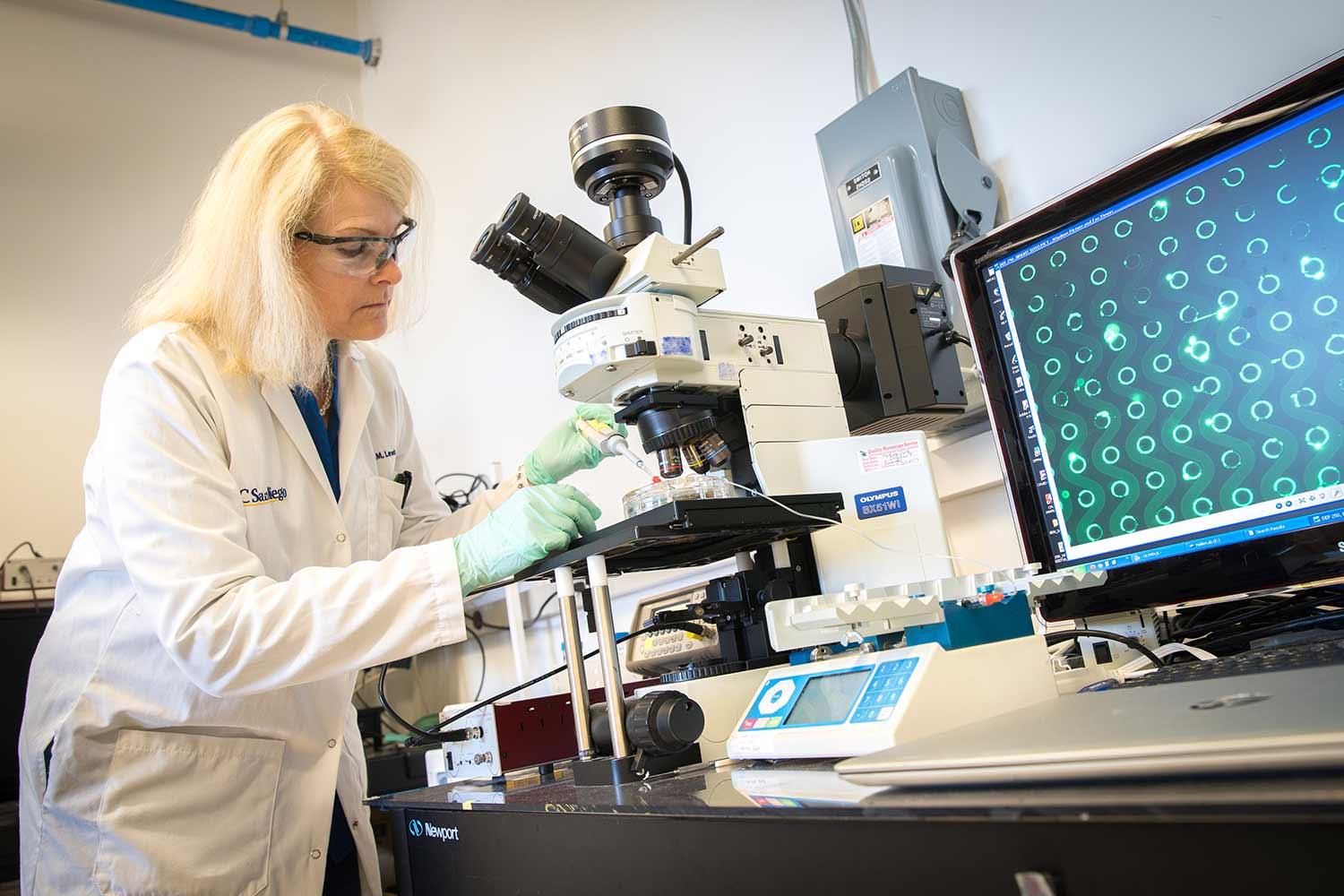
Researchers at Albert Einstein College of Medicine of Yeshiva University have developed a therapy for pancreatic cancer that uses Listeria bacteria to selectively infect tumor cells and deliver radioisotopes into them.
The experimental treatment dramatically decreased the number of metastases (cancers that have spread to other parts of the body) in a mouse model of highly aggressive pancreatic cancer without harming healthy tissue. The study was published today in the online edition of the Proceedings of the National Academy of Sciences.
“We’re encouraged that we’ve been able to achieve a 90 percent reduction in metastases in our first round of experiments,” said co-senior author Claudia Gravekamp, Ph.D., associate professor ofmicrobiology & immunology at Einstein who studies new approaches to treating metastatic cancer. “With further improvements, our approach has the potential to start a new era in the treatment of metastatic pancreatic cancer.”
Pancreatic cancer is among the deadliest of cancers, with a five-year survival rate of only 4 percent. The National Cancer Institute predicts that this year, 45,220 new cases of pancreatic cancer will be diagnosed and 38,460 people will die from the disease. Pancreatic cancer confined to the pancreas can be treated through surgery. But early pancreatic cancer is difficult to detect, since it rarely causes noticeable signs or symptoms. Most pancreatic cancer cases are diagnosed only after the cancer has spread (metastasized), typically resulting in jaundice, pain, weight loss and fatigue. But there is no cure for metastatic pancreatic cancer, and treatment focuses mainly on improving quality of life.
Several years ago, scientists observed that an attenuated (weakened) form of Listeria monocytogenes can infect cancer cells, but not normal cells. In a 2009 study, Dr. Gravekamp discovered the reason: The tumor microenvironment suppresses the body’s immune response, allowing Listeria to survive inside the tumors. By contrast, the weakened bacteria are rapidly eliminated in normal tissues. (Listeria in its wild form causes foodborne illnesses, particularly in immunocompromised people.)
Scientists later showed that Listeria could be harnessed to carry an anti-cancer drug to tumor cells in laboratory cultures, but this concept was never tested in an animal model. These findings prompted Dr. Gravekamp to investigate Listeria-tumor interactions and how Listeria could be used to attack cancer cells.
The idea of attaching radioisotopes (commonly used in cancer therapy) to Listeria was suggested by Ekaterina Dadachova, Ph.D., professor of radiology and of microbiology & immunology at Einstein and the paper’s co-senior author. Dr. Dadachova, who is also the Sylvia and Robert S. Olnick Faculty Scholar in Cancer Research, is a pioneer in developing radioimmunotherapies—patented treatments in which radioisotopes are attached to antibodies to selectively target cells including cancer cells, microbes or cells infected with HIV. When the antibodies bind to antigens that are unique to the cells being targeted, the radioisotopes emit radiation that selectively kills the cells.
Working together, Drs. Gravekamp and Dadachova coupled a radioactive isotope called rhenium to the weakened Listeria bacteria. “We chose rhenium because it emits beta particles, which are very effective in treating cancer,” said Dr. Dadachova. “Also, rhenium has a half-life of 17 hours, so it is cleared from the body relatively quickly, minimizing damage to healthy tissue.”
Mice with metastatic pancreatic cancer were given intra-abdominal injections of the radioactive Listeria once a day for seven days, followed by a seven-day “rest” period and four additional daily injections of the radioactive bacteria. After 21 days, the scientists counted the number of metastases in the mice. The treatment had reduced the metastases by 90 percent compared with untreated controls. In addition, the radioactive Listeria had concentrated in metastases and to a lesser extent in primary tumors but not in healthy tissues, and the treated mice did not appear to suffer any ill effects.
The Latest Bing News on:
Radioactive Bacteria
- Mystery of ‘Pharaoh’s curse’ finally SOLVED after experts claim they know reason for string of Tutankhamun tomb deathson April 26, 2024 at 5:36 am
THE chilling mystery of Tutankhamun’s cursed tomb has puzzled archaeologists for centuries after a string of suspicious deaths when it was opened up. But experts claim they have finally ...
- 25 Amazing Science Facts That Are Weird, Wild, and Trueon April 26, 2024 at 5:34 am
The wacky, the wild, and the weird Even if you weren’t someone who got excited about science class in school, now—as an adult—it’s hard not to be amazed by science facts. Seriously, just stop for a ...
- Concerns over salmonella in chicken; FCC restores net neutrality; quarterbacks selected early in NFL draft | Hot off the Wire podcaston April 26, 2024 at 4:45 am
Quarterback Caleb Williams is the first player taken in Thursday's NFL Draft, selected by the Chicago Bears, the Sixers, Magic and Nuggets are NBA playoff winners, the Panthers and Hurricanes win in ...
- All the News That’s Fit: Straight talk about hand dryers, human hairballs and the history of hearing aidson April 23, 2024 at 12:30 pm
Ammonium sulfate is an inorganic salt that is most commonly used as a lawn and soil fertilizer, but it’s also sometimes added to wine, sausage casings and baked products because it regulates acidity.
- Transporting hazardous materials across the country isn’t easy − that’s why there’s a host of regulations in placeon April 22, 2024 at 5:39 am
Ever wonder what those colorful signs with symbols and numbers on the backs of trucks mean? They’re just one visible part of a web of regulations that aim to keep workers and the environment safe ...
- North Korea creating viruses, bacteria & ‘poison pen’ weapons to spread diseases, claims US intelligenceon April 17, 2024 at 4:30 pm
NORTH Korea is feared to be creating lethal viruses and bacteria as part of Kim Jong-un’s biological warfare programme, according to US intelligence. The US claims that the tyrant has added ...
- How we study microbes keeps us from realizing their potential benefitson April 17, 2024 at 3:15 am
Since microbes behave differently in different settings, studying them in isolation limits our understanding of their combined functions, hampering the potential for innovative discoveries. A complex ...
- Exploring the lung microbiome’s role in diseaseon April 16, 2024 at 5:01 pm
Unusual microbial communities in a person’s lower airways could influence the onset and progression of lung cancer and other conditions, and might point the way to therapies.
- Analyzing isotopes for nitrate in sake for combating beverage fraud in Japanon April 16, 2024 at 2:15 pm
The demand for sake, a Japanese alcoholic drink, has increased globally. However, the rise in the popularity of sake has the potential for related beverage fraud. To address this issue, researchers ...
- Uranium-immobilizing bacteria in clay rock: Exploring how microorganisms can influence the behavior of radioactive wasteon April 16, 2024 at 12:26 pm
When designing repositories for high-level radioactive waste in deep geological layers, various factors must be carefully considered to ensure their long-term safety. Among other things, natural ...
The Latest Google Headlines on:
Radioactive Bacteria
[google_news title=”” keyword=”Radioactive Bacteria” num_posts=”10″ blurb_length=”0″ show_thumb=”left”] [/vc_column_text]The Latest Bing News on:
Pancreatic Cancer
- Purple Stride cancer walk raises funds for a cureon April 27, 2024 at 11:14 am
The annual PanCAN Purple Stride was held at James Island County Park to help fund research to find a cure for pancreatic cancer. The event took place Saturday from ...
- Long Island man who survived pancreatic cancer raises funds for PurpleStride walkon April 26, 2024 at 2:55 pm
After 48 years of marriage, three kids, and grandchildren the Stein family's lives were nearly shattered after Howie, a 71-year-old lawyer, was diagnosed with pancreatic cancer.
- PurpleStride Idaho rasises funds to end pancreatic canceron April 26, 2024 at 11:52 am
PurpleStride Idaho, an event raising funds to fight pancreatic cancer, is scheduled for Saturday, April 27 at the Ann Morrison Park Old Timer's Shelter in downtown Boise. Here's what you need to know: ...
- Lisa Niemi Swayze honors her husband's legacy by pushing for more research into pancreatic canceron April 25, 2024 at 5:22 pm
After her husband, Patrick Swayze died of pancreatic cancer, Lisa Niemi Swayze made it her mission to provide awareness and push for more research into one of the world's deadliest forms of cancer.
- Walk to end pancreatic cancer happening all over the countryon April 25, 2024 at 9:21 am
COMMUNITY A WALK TO END PANCREATIC CANCER. TAKING PLACE THIS WEEKEND AT NEARLY 60 VENUES ALL ACROSS THE COUNTRY. AND THAT INCLUDES RIGHT HERE IN SOUTH FLORIDA, JOINING ME TO TALK ABOUT PURPLE STRIDE.
- “Star Trek ”Actress Kitty Swink Had a 4% Survival Rate After Pancreatic Cancer — It's Been 20 Years (Exclusive)on April 25, 2024 at 8:44 am
"Seventeen days later, I came out of Cedars-Sinai with half my stomach, half my pancreas, my gallbladder gone, two feet of my intestines removed out, 28 lymph nodes removed and a 4% chance of ...
- Purple Stride event aims to raise money, awareness for pancreatic canceron April 24, 2024 at 6:52 am
One of the world’s most deadly forms of cancer is the focus of an event in central Iowa this weekend that will gather survivors from across the state, as well as advocates and loved ones of those ...
- Pancreatic Cancer Action Network to hold annual walk on April 27on April 22, 2024 at 6:58 am
Again, the PanCAN Purple Stride Walk for Cincinnati is Saturday, April 27. It’s at East Fork State Park. The event village opens at 8 in the morning. Click here for information.
- What Is Pancreatic Cancer?on April 22, 2024 at 5:30 am
Pancreatic cancer develops when abnormal cells in the pancreas grow uncontrollably, causing symptoms like fatigue, jaundice, and urinary changes.
- Has Immunotherapy Found Its Place in Pancreatic Cancer?on April 22, 2024 at 4:09 am
A new study suggested that adding nivolumab to neoadjuvant treatment improves outcomes in patients with borderline resectable pancreatic cancer.
The Latest Google Headlines on:
Pancreatic Cancer
[google_news title=”” keyword=”Pancreatic Cancer” num_posts=”10″ blurb_length=”0″ show_thumb=”left”]










